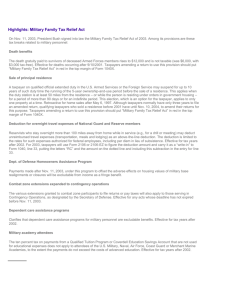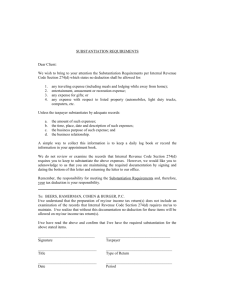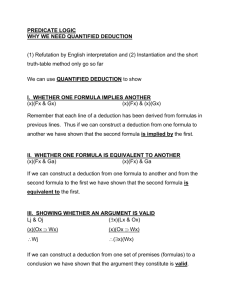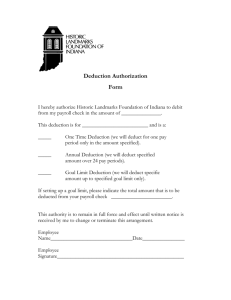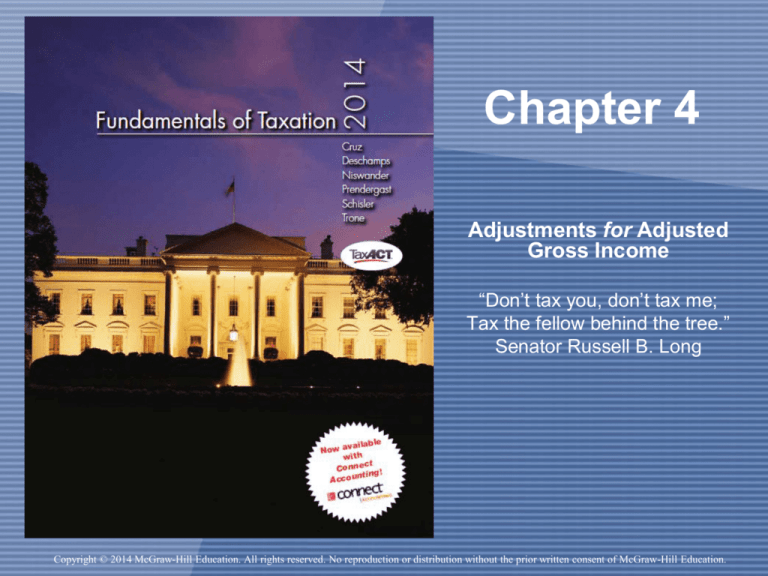
Chapter 4
Adjustments for Adjusted
Gross Income
“Don’t tax you, don’t tax me;
Tax the fellow behind the tree.”
Senator Russell B. Long
Companies,
Inc. 2010
Copyright © 2014 McGraw-Hill Education. All rights reserved. No reproduction or distribution without the prior ©The
written McGraw-Hill
consent of McGraw-Hill
Education.
McGraw-Hill/Irwin
LO #1 Student Loan Interest
• Only interest on a “qualified” student
loan is potentially deductible.
• A qualified education loan is one
incurred by the taxpayer solely to pay
qualified education expenses incurred
on behalf of the taxpayer, taxpayer’s
spouse, or any dependent of the
taxpayer at the time the loan was
incurred.
• The deduction is limited to $2,500 per
year.
4-2
LO #1 Student Loan Interest
• Qualified education expenses must be
paid or incurred within a reasonable
period before or after the loan date
• Expenses must occur during the
period the recipient was carrying at
least half the normal full-time workload
for the intended course of study.
• The course of study can be either at
the undergraduate or graduate level.
4-3
LO #1 Student Loan Interest
• The deductible amount of student loan
interest is reduced when modified
adjusted gross income reaches:
– $125,000 on a joint return ($60,000 for a
single return) and:
– is totally eliminated when modified
adjusted gross income reaches $155,000
($75,000 for single returns).
4-4
LO #2 Health Savings Account Deduction
A health savings account (HSA) is a
tax-exempt savings account used for
qualified medical expenses.
– It can be used for the expenses of the
account holder, spouse, and dependents.
• In general, qualified taxpayers can
take a for AGI deduction for
contributions to the HSA.
4-5
LO #2 Health Savings Account Deduction
To be eligible for an HSA, the taxpayer must be selfemployed, or an employee (or spouse) of an
employer with a high deductible health plan, or an
employee of a company that has no health coverage
and has purchased a high-deductible policy on his or
her own.
– In addition, the individual must have no other
health insurance coverage, except certain
specified coverage.
– Taxpayers cannot have other health insurance
except for coverage for accidents, disability,
dental care, vision care, long-term care, or
workers’ compensation
4-6
LO #2 Health Savings Account Deduction
• A High Deductible Health Plan (HDHP) is a
health plan with specified minimum deductible
amounts and a maximum annual deductible
and out-of-pocket expense limitation.
• For calendar year 2013, these amounts are as
follows:
Minimum
Deductible
Individual Coverage
Family Coverage
$1,250
$2,500
Maximum Deductible
and Annual Outof-pocket
$ 6,250
$12,500
4-7
LO #2 Health Savings Account Deduction
• Taxpayers who contribute to or
withdraw from an HSA during the year
must file a Form 8889 and attach it to
their Form 1040.
• Contributions made by a qualified
individual are a for AGI deduction,
assuming the limitations are met.
• Distributions from an HSA are tax free
as long as they are used to pay for
qualified medical expenses.
4-8
LO #3 Moving Expenses
If a taxpayer moves due to a change in
job location or to obtain a job, certain
expenses related to moving may be
deducted as a for AGI deduction.
• Moving expenses are reasonable
expenses for:
– Moving household goods and personal effects
from the old residence to the new residence.
– Traveling from the old residence to the new
residence (including lodging, but excluding
meals).
– Moving expenses of persons other than the
taxpayer are permitted if the other persons are
members of the taxpayer’s household.
4-9
LO #3 Moving Expenses
• To qualify for a moving expense deduction,
taxpayers must meet two additional tests in
addition to the change in employment
location test.
• Distance test - the new job location must be
at least 50 miles farther from the taxpayer’s
old residence than was the old job location.
– If the taxpayer had no old job (i.e., the taxpayer
was unemployed), then the new job must be
more than 50 miles away from his or her old
residence.
4-10
LO #3 Moving Expenses
4-11
LO #3 Moving Expenses
• Moving expenses are only deductible in the
year incurred.
• If the taxpayer elects to deduct the moving
expenses prior to satisfying the time test
and later does not meet the test, the moving
expenses are disallowed. Must file
amended return.
• Employers may reimburse employees for
some or all of their moving expenses.
– Only “net amount” is deductible
4-12
LO #4 Deduction for Half of
Self-Employment Tax
• Self-employed individuals pay selfemployment, or FICA, tax equal to
15.3% of net earnings from selfemployment.
• Net earnings are revenues minus
expenses.
• Self-employment tax is calculated on
Form SE.
– The Form SE is filed with the taxpayer’s
1040.
4-13
LO #5 Self-employed Health Insurance
Deduction
• Self-employed individuals may be able
to deduct 100% of self-employed
health insurance payments.
• The amount of the deduction may be
limited in two respects:
– First, taxpayers cannot take a deduction
for the amount in excess of net earnings
from self-employment from the trade or
business under which coverage is
provided.
4-14
LO #5 Self-employed Health Insurance
Deduction
• The second limitation pertains to
availability of other health insurance
coverage.
– If the taxpayer is entitled to participate in
any subsidized health plan maintained by
any employer of the taxpayer or of the
taxpayer’s spouse, a deduction is not
allowed.
– Eligibility for alternative coverage is
determined on a monthly basis.
4-15
LO #6 - Penalty on Early Withdrawal of
Savings
• If a taxpayer withdraws funds early from
a time deposit account, like a CD, he or
she may be subject to an early
withdrawal penalty.
• The taxpayer is entitled to report the
penalty as a for AGI deduction on line
30 of Form 1040.
• The amount of the penalty is reported on
a Form 1099-INT, issued by the financial
institution.
4-16
LO #7 Alimony Paid
Alimony is one of three potential
payments that can exist in a divorce or
legal separation.
Alimony, child support, property
settlement
Only alimony has a tax consequence.
If payments properly qualify as
alimony, the payments are deductible
by the payer as a for AGI, or an abovethe-line, deduction.
4-17
LO #8 Educator Expenses
• Eligible educators can deduct up to
$250 of qualified education expenses
as a for AGI deduction.
– If the taxpayers’ filing status is married
filing jointly and both individuals are
eligible educators, the maximum
deduction is $500.
– but neither spouse can deduct more than
$250 of his or her expenses.
4-18
LO #8 Educator Expenses
• Qualified education expenses for the
deduction are those for books,
supplies, equipment (including
computers and software), and other
materials used in the classroom.
– The expense must also be ordinary
(common and accepted in the educational
field) and necessary (helpful and
appropriate).
4-19
LO #9 Tuition and Fees Deduction
• Taxpayers can take a deduction for
qualified tuition and related expenses
paid during the year for the taxpayer,
taxpayer’s spouse, or a dependent.
• The deduction is a maximum of $4,000
but can be smaller if the modified AGI
of the taxpayer exceeds certain limits.
4-20
LO #9 Tuition and Fees Deduction
• Payments must be to a qualified
educational institution and must be for
a student taking one or more courses
at that institution.
• Only tuition and related expenses
qualify.
– Taxpayers cannot claim a deduction for
tuition paid for elementary and secondary
school education.
4-21

